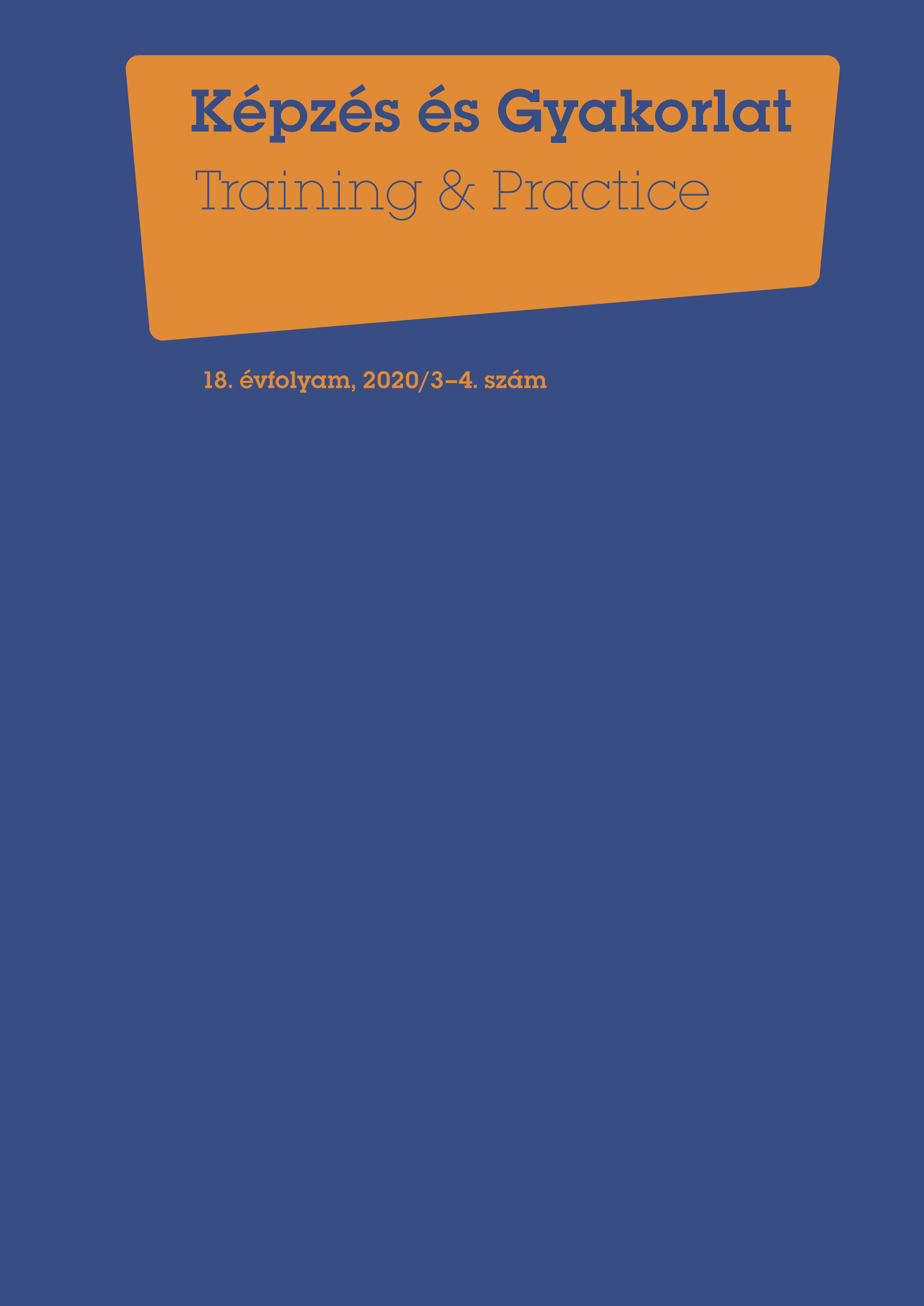Kooperatív tanulás a felsőoktatásban – nemzetközi kitekintés
DOI:
https://doi.org/10.17165/TP.2020.3-4.12Resumen
A felgyorsult technikai fejlődés és a munkaerő piaci elvárások a felsőoktatást új kihívások elé állítják. A kooperatív munka jelen van a termelés minden szintjén. Mindezekre egyfajta válasz lehet a kooperatív tanulás, mint oktatási módszer bevezetése a felsőoktatásban. A kooperatív tanulás megfelelő előkészítéssel hatékonyabb a felsőoktatásban jelen lévő hagyományos munkaformáknál, és többek között olyan kompetenciákat fejleszt, melyek a felsőoktatásból kikerülő hallgatók számára előnyt jelenthetnek a munkaerőpiaci érvényesülésben. A tanulmány körüljárja a kooperatív tanulás külföldi gyakorlatát, és bemutatja a módszer előnyeit és esetleges buktatóit.
Referencias
Astin, A. W. (1993). What matters in college. Liberal Education 79(4), 4-15.
Basili, P.A. & Sanford, J.P. (1991). Conceptual change strategies and cooperative group work in chemistry. Journal of Research in Science Teaching 28 (4), 293-304. DOI: https://doi.org/10.1002/tea.3660280403
Bakó B., Simon K. (2010) Kooperatív tanulás, Segédlet a kompetencia alapú felsőoktatás módszertani megújulásához. Sopron: Nyugat-Magyarországi Egyetem [online] https://www2.itworx.hu/cgi-bin/itworx/download.cgi?vid=606&uid=-1&dokid=366
Bazsa Gy. (2009). Változások, változtatások, megrázkódtatások a magyar felsőoktatásban az elmúlt két évtizedben. In Hrubos I. & Török I. (szerk.), Intézményi menedzsment a felsőoktatásban: Szemelvények kiemelt témakörökben (pp. 13-26). Budapest: Műegyetemi Kiadó
Benda J. (2002). A kooperatív pedagógia szocializációs sikerei és lehetőségei Magyarországon 1. Új Pedagógiai Szemle 52(9), 26-37. http://epa.oszk.hu/00000/00035/00063/
Bennett, N. (1991). The Emanuel Miller Memorial Lecture 1990 Cooperative Learning in Classrooms: Processes and outcomes. Journal of Child Psychology and Psychiatry 32(4), 581-594. DOI: https://doi.org/10.1111/j.1469-7610.1991.tb00336.x
Bossert, S. (1988-89). Cooperative activities in the classroom. Review of research in education, 15, 225-250. DOI: https://doi.org/10.2307/1167365
Boyd, J. (é.n.). The future of cooperative learning. [online] http://julieboyd.com.au/wp-content/uploads/The-Future-of-Cooperative-Learning-D4.pdf
Csepeli Gy. & Prazsák G. (2010). Internet és társadalmi egyenlőtlenség Magyarországon. Tudományos közlemények 23 (április), 7-19. [online] forrás
Davidson, N. & Worsham, T. (1992). Enhancing thinking through cooperative learning. New York, NY: Teacher's College Press.
Dept. JSB. Au. (2017). National Work Experience Programme. [online] https://www.employment.gov.au/national-work-experience-programme
Druyen, C. & Wichterich, H. (2005). Demokratiebaustein: Kooperatives Lernen für die Demokratie. BLK Programm: Demokratie-Baustein. Berlin: BLK [online] https://www.pedocs.de/volltexte/2008/309/pdf/kooperatives_lernen_komplett.pdf
George, P. G. (1994). The effectiveness of cooperative learning strategies in multicultural university classrooms. Journal on Excellence in College Teaching 5(l), 21
Grant-Vallone, E. J. (2011). Successful group work: Using cooperative learning and team-based learning in the classroom Journal on Excellence in College Teaching 21 (4), 99-121. [online] https://eric.ed.gov/?id=EJ915277
Forray R. K., Varga A. (2011). Inklúzió a felsőoktatásban. Pécsi Tudományegyetem Bölcsészettudományi Kar [online] http://janus.ttk.pte.hu/tamop/tananyagok/inkluzio_a_felsooktatasban/index.html
Halász G., Balázs É., Fischer M. & Kovács I. V. (szerk.) (2011). Javaslat a nemzeti oktatási innovációs rendszer fejlesztésének stratégiájára. Budapest: Oktatáskutató és Fejlesztő Intézet [online] http://mek.oszk.hu/13500/13532/13532.pdf
Hassan, M. A. & Fook, F. S (2012). E-learning modules supported by cooperative learning: Impact on Arabic language achievement among Qatar University students. Near and Middle Eastern Journal of Research in Education, 2012 (1) DOI: https://doi.org/10.5339/nmejre.2012.1
Heiter, M. (é.n.). Kooperatives Lernen mit Zeitreise. Stuttgart: Klett [online] https://bridge.klett.de/DUA-31LRXXPH8R/content/media/w_310433.pdf
Joritz-Nakagawa, J. (2003). Spencer Kagan's cooperative learning structures. Global Language Conference proceedings and supplements, Tokyo, Japan [online] http://hosted.jalt.org/pansig/PGL2/HTML/Nakagawa.htm
Kagan, S. (2004). Kooperatív tanulás: minden korosztálynak. (2., jav. kiad.) Budapest: Ökonet Kagan, D. M. (1990). Ways of evaluating teacher cognition: Inferences concerning Goldilocks Principle. Review of Educational Research 60 (3), 19-69. DOI: https://doi.org/10.3102/00346543060003419
Kaufman, D., Sutow E. & Dunn, K. (1997). Three approaches to cooperative learning in higher education. The Canadian Journal of Higher Education 27 (2-3), 37-66. DOI: https://doi.org/10.47678/cjhe.v27i2/3.183303
Kozma T. (2006). Az összehasonlító neveléstudomány alapjai. Budapest: Új Mandátum [online] http://mek.oszk.hu/08900/08963/08963.pdf
Matthews, M. (1992). Gifted Students Talk About Cooperative Learning. Educational Leadership, 50 (2) 48-50. [online] http://www.ascd.org/publications/educational-leadership/oct92/vol50/num02/Gifted-Students-Talk-About-Cooperative-Learning.aspx
Lencse M. (2013). Módszertani kérdések a felsőoktatásban. Kooperatív tanulás az egyetemen. Taní-tani Online [online] http://www.tani-tani.info/101_lencse
Millis, B. J. (1996). Introducing faculty to cooperative learning. In W. A. Wright. Teaching improvement practices: Successful strategies for higher education. Bolton, Mass.: Anker.
Nam, Ch. & Zellner, R. D. (2011). The relative effects of positive interdependence and group processing on student achievement and attitude in online cooperative learning. Computers & Education 56 (3), 680-688. DOI: https://doi.org/10.1016/j.compedu.2010.10.010
National Library of Australia (é.n.). Work experience and internship, [online] https://www.nla.gov.au/work-experience-program
Nótin Á., Páskuné Kiss J., Kurucz Gy. (2015): Alkalmazott pszichológia 15 (4): 109-131. http://ap.elte.hu/wp-content/uploads/2016/03/AP_2015_4_NOTIN_ETAL.pdf
Pap-Szigeti R. (2007). Kooperatív módszerek alkalmazása a felsőoktatásban. Iskolakultúra, 17. évf. 1. sz. pp. 56-66. [online] http://epa.oszk.hu/00000/00011/00111/pdf/iskolakultura_EPA00011_2007_01_056-066.pdf
Pascarella, E. T. & Terenzini, P. T. (1991). How college affects students: Findings and insights from twenty years of research. San Francisco, CA: Jossey-Bass
Simándi Sz. (2016). Fiatal és felnőtt hallgatók a felsőoktatásban : A felsőoktatás módszertani vetületei és kihívásai, pp. 101-104. Líceum Kiadó, Eger [online] http://nevelestudomany.uni-eger.hu/public/uploads/simandi-szilvia-konyv-2016_57c549966aaa4.pdf
Simándi Sz., Kis-Tóth L., Molnár E., Forgó S., Tóth T. (2015) Kutatások a felsőoktatásban és a felnőttképzésben. KEZEK, Eger http://okt.ektf.hu/data/szlahorek/file/kezek/01_simandi_04_16/index.html
Slavin, R. E. (1990). Cooperative learning: Theory, research, and practice. Englewood Cliffs, NJ: Prentice Hall
Studyandwork agency (2016). About us https://www.studyandwork.com.au/
Thanh, P. T. H., Gillies, R. & Renshaw, P. (2008). Cooperative learning (CL) and academic achievement of Asian students: a true story International Education Studies 1 (3), 82-88. DOI: https://doi.org/10.5539/ies.v1n3p82
Descargas
Publicado
Número
Sección
Licencia
Derechos de autor 2020 Czinege Monika, Szabó Csaba

Esta obra está bajo una licencia internacional Creative Commons Atribución-NoComercial-SinDerivadas 4.0.












